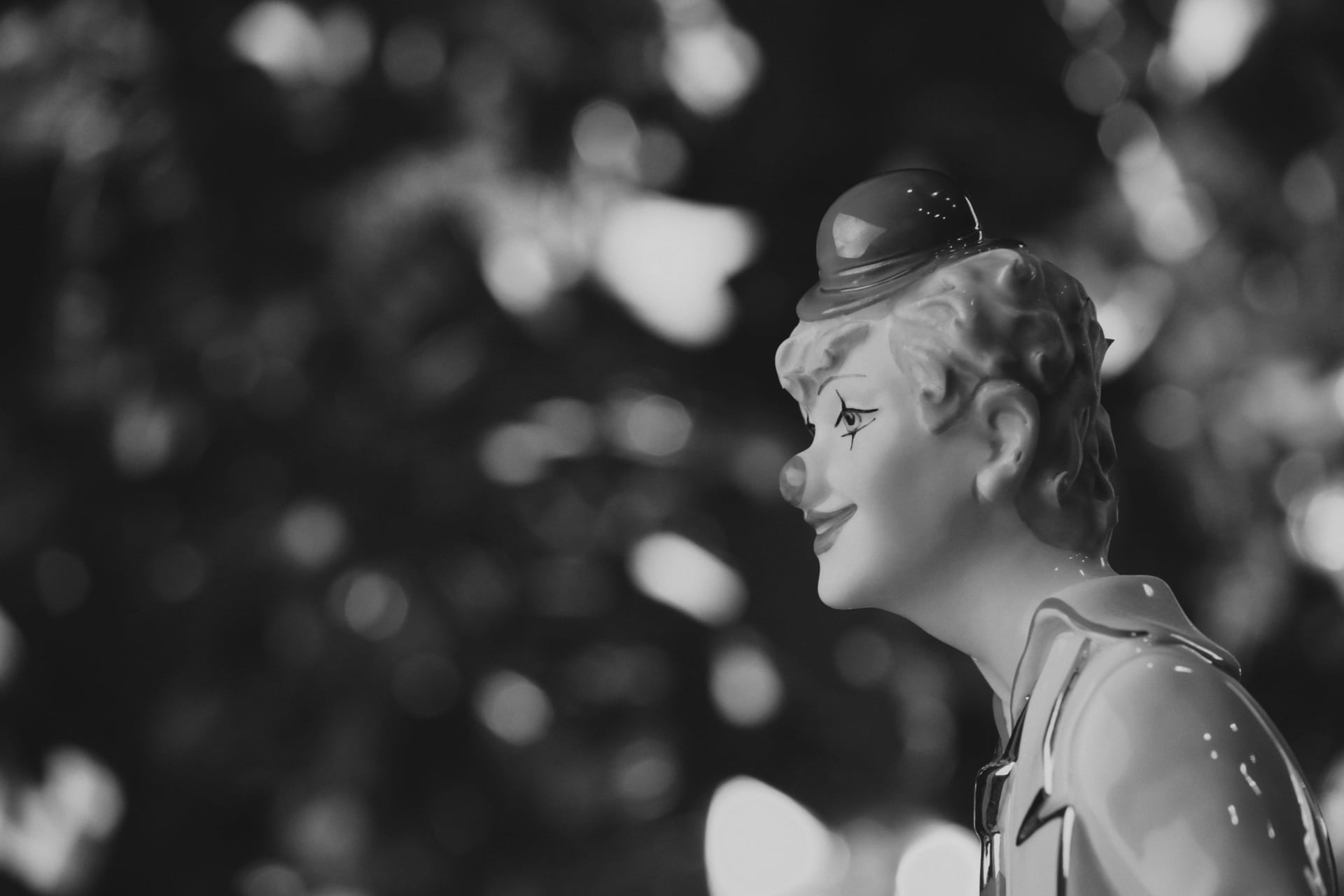Only some people can hear it, but you, you’re one of them. You hear them, the people in the poster. That’s why you cross the street to look at it, the vintage circus poster in the little second-hand shop in Wallingford.
It’s not one of those antique shops where people plan to go; it’s more a place where people wash up while they’re waiting for takeout. The shop has a handmade sign with peeling paint, and it’s on a minor arterial in a marginal part of Seattle, two blocks from a freeway overpass, jammed in between a market that sells mostly booze and cigarettes and a down-at-heel salon with a flashing neon light in the corner flashing NAILS NAILS NAILS.
You were having after-work drinks with friends at a bar across the street, one with craft beer and hummus so good it tastes like it was made this morning on the sunny slopes of the Parthenon instead of last week at Costco. It’s where the shuttle from your company lets you off at the end of the day, just at the edge of the trendy neighborhood where you all live. The three of you get together a couple times of week, something to break up the routine. You’re all in software, you’re all married, you’re all bored. You all have a crush on the bartender Ken. The world spins round.
But then, that rainy March night on that minor arterial between Wallingford and Green Lake and I-5, you hear it, that faint, far-off noise like the circus has come to town. You catch the smell of sea air, the feel of sunlight on your sun-starved skin.
And then you see it, the poster. You see the top corner of it through the window. The blonde in the top hat, who looks familiar in a way you can’t name, seems like she’s looking at you. That’s where it’s coming from, the sounds, the smells. It must be.
You tell your friends you’ll be back, and you cross the street, rain shishing from the cars on the overpass. But when you get to the shop door, something stops you from walking in. You look back at the bar. Was this a mistake? Maybe you’ll make a joke out of it, flash your friends. You’re all in your forties, barely visible anymore to the male public, let alone your husbands. You even dress the same, in Eileen Fisher and Ann Taylor and Banana Republic, in beige and grey and taupe, practical colors that don’t show stains. As if you needed any more camouflage. So if you flash them, no one will notice but them. But—and this is the key thing—it’ll make them laugh and forget you did something this weird.
But your friends are not looking at you. They’re looking at Ken, who is looking at you. He gives you a small half wave, a small half smile. He would notice if you flashed him. And maybe that’s okay. Maybe that’s good.
Instead, you turn back to the shop.
All you can see is the poster.
And suddenly it’s like you’re falling, wheeling end over end in a wave that, once it lets you go, won’t send you bobbing back up to the surface. Instead, it will pin you to the ocean floor until you lose your breath.
You’re not wrong. That’s exactly what’s happening, but don’t worry. It doesn’t hurt. Well, maybe for a second.
What breaks you out of it is a human sound, someone coughing at the back of the shop, only not like she’s sick. Like she’s sending a message. It’s an old woman hunched over the darkened counter, peering at you from behind large red eyeglasses, the Sally Jessie Raphael ones that everyone had in the 80s. You didn’t see her at first because she’s behind a hulking old register, its silver plate rubbed off in spots.
“Oh,” you say. “I didn’t see you there.”
She smiles. It looks like a gash. She taps the front of the counter, on which hangs a large handwritten sign, big black letters shaky but adamant: YOU BREAK IT YOU BOUGHT IT.
You turn back to the poster.
You can’t take your eyes off it.
You have the idea that it can’t take its eyes off you.
The poster is tall, almost your height, and framed in ornate gold-painted wood that winds and curls its way along like golden smoke. Its curves have edges, sharp ones. The words The Flying Brights soar at the top of the poster, and below that, three women’s faces hover over a striped circus tent like the Great and Powerful Oz. The tent is lit from within, standing proudly on a green hillside, the ocean surging behind it. Stars pop out of an indigo sky, little glints of white so pure they might be silver. They give way to a border of shadowy faces, avid, like the ones in a crowd. Below the tent, a buxom aerialist swings from Roman rings, a slight blonde equestrienne pirouettes on a massive white horse, and a curvy brunette strikes a pose in front of a target, wearing a leotard that looks like a cluster of stars. Beside them, but out of all proportion, since she runs the length of the poster, is the master of ceremonies. It’s a tall, stately woman in a sparkling ruby-red tuxedo and matching hat, one hand thrown in the air.
The old woman is no longer behind the desk. She is beside you. She is grinning at you, yellow teeth set askew in her mouth like trees felled by a forest fire. Your heart clutches in your chest. How did she sneak up on you?
She points at the sign above the poster, which reads, NO TOUCHING.
You can smell blood. It’s not yours, is it? You’re not hurt.
Are you?
Then you realize the calliope music that drew you from the bar? It’s coming from the poster. You can smell popcorn, too, thick with butter, the kind of thing you don’t allow yourself anymore because of carbs. You can smell salty air and the papery, dry smell of straw. You can hear the wind beat against the firm canvas walls of the tent, a low percussive sound, and from the back of the tent, is that—is it?—the sound of two people having sex, firm bodies slapping together in unmistakable rhythm. Something jingles in time, something like little silver discs tied to a costume, the kind that are meant to flash distractingly at the crowd while you pull something out of a pocket hidden up your sleeve. You can hear the grunting—they’re close; it may be six months since your last marital maintenance sex, but you have not forgotten the good times—and you breathe in the animal smell of them, mixed with cigar smoke and cheap latex.
Oh God, you think. I could just run away and join the circus.
You smell blood, thick and coppery and alive in the dusty wasteland of the shop. There’s a thin trickle of it running down from your ruby red nail, where, you realize, you have been biting a hangnail. It should hurt, but it doesn’t. And isn’t that odd? It should sting like crazy.
I could just run away, you think. Step out of your carefully curated life, the marriage, the career, the house, the friends. The cars, the trips, the blah blah blah. All that stuff you thought you had to have, because you thought that was what you were supposed to do. Who in the world told you that? And why in the world did you listen?
But you did, and here’s how that turned out: being so divorced from your body that you barely notice a wound. That the sight of your own blood takes you by surprise.
You imagine it, hearing the horses nicker as they munch the sweet hay. Imagine hearing it as a man who finds you foxy just as you are, old and fat and a little too fond of Sapphire gimlets, traces kisses up the inside of your arm and tells you you’re the sexiest thing he’s ever seen.
NO TOUCHING, the sign reminds you. But the old woman is gone. The lights are off. And the sign on the door has been switched to SORRY CLOSED.
The poster almost seems like a painting, now. If you did touch it, which you wouldn’t, the sign is right there, you think you could feel the little ridges and layers of the brush strokes. The paint on the tent is so matte it’s almost chalky, with its stripes of cream and deep carmine red. The colors are so rich, so deep, that even being in its presence is changing you. You can feel that. But touching it—that’s a step too far.
You look back across the street, but the mist has intensified, and you can’t quite make out your friends in the bar. Whereas the poster is as bright and vital as a beating heart. You throb along with it.
You have to touch it. You have to.
Fuck it, you think, and around you a hallelujah chorus swells, as if the world has been waiting for this, for you. Something in it will make you whole again, you just know it. It could be you behind the tent, panting on all fours, ass up to the sky, animal. It could be you, spinning on that trapeze, doing flying somersaults as the horse runs beneath you. It could be you, running the show.
So you touch it. You slide a finger across the sharp edge of one of the curves. It’s the hangnail finger; you leave a little trail of blood behind.
But before you can clean it up, the woman in the top hat reaches for you with her satiny red hand (and here you thought they were gloves), but delicately, as if each of her fingers were razors.
And maybe they are, because there it is, that acceleration, that sensation of being thrown from a horse at a great speed, dragged through something that rakes your skin— like straw, or the knife act’s collection of lithe little blades. Hurled so far that you have time to wonder if you will ever land.
And then you do.
You see your friends with a frame around them, now. That’s because you are peering out from the margins of a vintage circus poster, one of a crowd of shadowy faces. You see them pay Ken and open the big old wooden door of the bar and look up and down the street for you. You see them spot your car and look at the second-hand shop. They shrug and walk away.
They walk away.
You would never do that to them, you think, though in fact that’s what you did just five minutes ago.
Before they hit the corner, they have forgotten you. You want to cry out, you want to cry for help—this is not what you thought it would be; you thought it would be you and maybe Ken hitting it behind the tent—and in a panic, you turn to the person next to you.
The man is maybe 28, burly in a farm-boy kind of way, and he looks a little like Ken. In fact, he could be Ken’s kid brother. He smiles at you and tips his hat, a dusty, slightly mashed felt thing with a tidy little brim. It looks good on him. Not like a costume. Like it belongs.
Like you belong.
You smooth the skirt of your ditsy-print dress, the kind women used to make out of flour sacks. You, in fact, made this out of flour sacks, with your mother’s help. Your mother is still alive, here. She is waiting for you at home with a fresh peach pie.
You take your first breath, and it is better than you thought it would be.
I told you it only hurts for a second.

